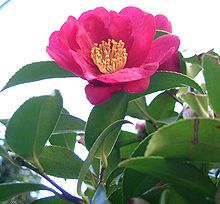| Camellia sasanqua | |
|---|---|

| |
| Conservation status | |
 Least Concern (IUCN 3.1) | |
| Scientific classification | |
| Kingdom: | Plantae |
| Clade: | Tracheophytes |
| Clade: | Angiosperms |
| Clade: | Eudicots |
| Clade: | Asterids |
| Order: | Ericales |
| Family: | Theaceae |
| Genus: | Camellia |
| Species: | C. sasanqua |
| Binomial name | |
| Camellia sasanqua Thunb. | |
Camellia sasanqua, with common name sasanqua camellia, is a species of Camellia native to southern Japan (Kyushu, Ryukyu Islands and Shikoku). It is usually found growing up to an altitude of 900 m (3,000 ft).
Growing to 5 m (16 ft) tall, this evergreen shrub has leaves that are broad and elliptic, 3–7 centimetres (1.2–2.8 in) long and 1.2–3 centimetres (0.5–1.2 in) broad, with finely serrated margins. The flowers are 5–7 centimetres (2.0–2.8 in) in diameter, with 5 to 8 white to dark pink petals.
History and uses
At the beginning of the Edo period, cultivars of Camellia sasanqua began appearing; the first record of the cultivars of this plant was made by Ihei Ito (1695–1733). The Japanese call it Sazanka (サザンカ, 山茶花).
This plant was not known in western society until in 1820 Captain Richard Rawes of the East Indiaman Warren Hastings brought Camellia sasanqua var. stricata to his relation, Thomas Carey Palmer, of Bromley in Kent. Then in 1869, Dutch traders imported some specimens into Europe. It has now also been introduced to Australia, New Zealand and the United States.
It has a long history of cultivation in Japan for practical rather than decorative reasons. The leaves are used to make tea while the seeds or nuts are used to make tea seed oil, which is used for lighting, lubrication, cooking and cosmetic purposes. Tea oil has a higher calorific content than any other edible oil available naturally in Japan.
Camellia sasanqua is valued in gardens for its handsome glossy green foliage, and fragrant single flowers that can range in color from white to deep pink and are produced extremely early in the season. Various cultivars have been selected, of which 'Crimson King', 'Hugh Evans' and 'Jean May' have gained the Royal Horticultural Society's Award of Garden Merit.
See also
Citations and references
- Citations
- ^ "Camellia sasanqua". Germplasm Resources Information Network. Agricultural Research Service, United States Department of Agriculture.
- "Winter Flowers"Camellia sasanqua"". May 11, 2011. Archived from the original on 2011-05-11.
- ^ "Royal Botanic Gardens & Domain Trust - Camellias". February 4, 2012. Archived from the original on 2012-02-04.
- Bretschneider (1898), pp. 282-3.
- Camellia sasanqua Archived 2017-06-10 at the Wayback Machine in BoDD – Botanical Dermatology Database
- "RHS Plant Selector - Camellia sasanqua 'Crimson King'". Archived from the original on 24 February 2020. Retrieved 23 February 2020.
- "RHS Plant Selector - Camellia sasanqua 'Hugh Evans'". Archived from the original on 24 February 2020. Retrieved 23 February 2020.
- "RHS Plant Selector - Camellia sasanqua 'Jean May'". Archived from the original on 24 February 2020. Retrieved 23 February 2020.
- References
- Bretschneider, E. (1898) History of European Botanical Discoveries in China, Volumes 1-2. (Sampson Low, Marston and Company).